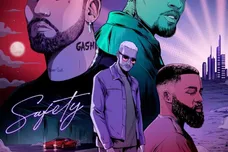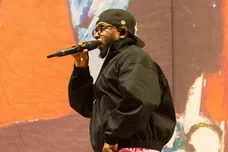The retirement-turned-comeback arc in hip-hop is as old as the genre itself. Jay-Z just dropped one of his most personal and emotionally vulnerable albums, 14 years after claiming to retire and throwing himself a “Farewell” concert. Pastor Ma$e just (finally) dissed Cam’ron. None of your favs are immune to this tomfoolery. Childish Gambino; Lupe Fiasco; 50 Cent has done it multiple times. However, no one has turned the art of a “comeback album” into a habitual crutch quite like Eminem.
2009’s Relapse, his sixth studio album and first solo body of work since Encore five years prior, was to be the reemergence of Slim Shady everyone was supposedly waiting for. Recovery, the following year, saw a hard turn into anthemic stadium music. In his own words, the lukewarm reaction to Relapse and subsequent critiques of his shock-value raps got to him. By 2013, it was time for another pseudo-reset; Recovery didn’t garner the unanimous critical acclaim he was clearly aiming for.
So what’s a former golden boy to do? Revamp his most critically acclaimed album, of course. Joining forces with the legendary Rick Rubin, Eminem finally did the inevitable: make a sequel. He made follow-ups to old songs, dyed his hair blonde again and invoked all sorts of other nostalgic imagery for the album artwork and subsequent rollout. The King was back, right?!
Not quite.
While Recovery and Marshal Mathers LP II were both met with widespread fanfare and were clear steps in the right direction, the whispers still persisted. The discussion around Eminem’s once undeniable talent continued to become polarized. The word around town was that his content was outdated, fluctuating nonsensically between jokey toilet humour and trite, by-the-numbers, motivational anthems. While his technical ability was only getting more impressive, his style was becoming too rigid. As he levelled up his pen game, the rest of his artistry seemed to be eroding before our very eyes.
After the jumbled mess that was Encore, Eminem’s on-going battle with addiction had reached a fever pitch and he withdrew from the public eye. Fortunately for his fans - and the culture as a whole - he got sober and attempted to shift his focus back to his art. However, after losing loved ones (r.i.p. Proof) and enduring a mentally and physically taxing rehabilitation, he was faced with yet another hurdle: writer's block. On Relapse, Em tried to overcome his creative stagnation by slipping back into his sinister Slim Shady skin. The once classic chemistry between the duo felt off as Eminem was finding his footing once again, but we were still left with a batch of pristine Dr. Dre beats and the occasional jaw-dropping Eminem verse. In hindsight, Relapse might be the most comfortable he’s sounded since his comeback.
Recovery isn’t bad - it just sounds like a midlife crisis on wax. He claimed to still be flushing drugs out of his system while creating Relapse and marketed Recovery as his true return to form. To his credit, Recovery actually sees Eminem taking a lot of risks. He worked with new producers and flirted with new sounds. He tried his hand at various styles of rap that he'd previously scoffed at. Even if all of his fans weren't fans of all his choices, there was something for everyone on here. It was exciting, spawned organic hits like "Love The Way You Lie," and saw him addressing his addiction and subsequent healing in ways he'd never had.
The issue with the much-hyped sequel to what many consider Em's magnum opus, is that it's just too damn safe. Even if it didn't share the same namesake as one of the most shocking rap albums to date, it’s easy to see how MMLP2 is of the most inconsequential and least daring albums in Em's discography. It did nothing in terms of teasing artistic progression, adding to his (admittedly already fleshed out) cannon or just giving us exciting songs that will last beyond the moment. Also, "Stronger Than I Was" is just a no - no, no no.
All this to say, Revival looks to be his most recent attempt at shifting the dialogue surrounding his legacy, and it really needs to deliver in order to move the needle. No shade, but if you think about it, every solo album this decade from the once prolific Detroit MC has been dubbed as a “return to form” of sorts. It’s hard to ignore how heavily he’s been relying on the "comeback" motif to garner attention. At some point, we need to ask ourselves: do we let legends limp to the finish line because of how undeniable their initial run was? Or do we engage honestly with their art and challenge them to grow with us?
When is it the right time to ask for more? Eminem has always struggled with balancing his self-awareness, piercing wit and social commentary with his more self-indulgent tendencies (overly technical rapping, off-brand humour, formulaic songwriting). So, is it fair to suggest that he’s rightfully earned any and all recent backlash due to his half-way approach over the past decade?
“Walk on Water,” the lead-single from Revival, acknowledges these very concerns. It’s a stripped down balled, filled with self-doubt and insecurity. The follow-up, “Untouchable,” turns the gaze outward, and finds the world’s most recognizable pop star directly addressing the socio-political advantages of his whiteness. It’s exhilarating - he does so in a way he truly hasn’t since maybe The Eminem Show’s “White America.” With these two singles under our belt, it’s clear that Em wants to push his artistry and remain a well-rounded staple of rap culture.
A part of us believes Eminem is acutely aware of every point of view we’ve mentioned in this article - especially after considering how self-reflective “Walk on Water" was and how socially conscious “Untouchable” turned out to be. If his fans continue to remain honest with him, there’s no doubt that he can produce another career-affirming album. The current racial tensions in this country may have finally given him some poignant content to grasp on to after a few years of pulling at the withered threads of old narratives. All we can do is wait and pray that the Rap God delivers on his endless potential.
Sound off below with your own take on Eminem's current artistry and the quality of his past three solo efforts and vote for your favourite 'comeback' album.







